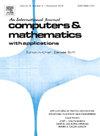弱阻尼Klein-Gordon方程的保守原始混合有限元法
IF 2.9
2区 数学
Q1 MATHEMATICS, APPLIED
引用次数: 0
摘要
基于原始混合有限元法对空间变量进行离散化,得到了弱阻尼Klein-Gordon方程的半离散格式。结果表明,该方法具有能量保守性,并利用改进的椭圆投影证明了能量范数的最优误差估计。此外,还得到了一个超收敛结果,从而得到了最大范数估计。然后,非标准型参数在L∞(L2)范数上进行了最优误差分析,并简化了对解的正则性假设。进一步,建立了拉格朗日乘子的最优收敛阶,并推导了修正椭圆投影与原始混合有限元解在最大范数下的误差梯度的超收敛结果。对于完全离散格式,在时间方向上采用能量守恒的有限差分方法,并利用browwer不动点定理的一个变体来证明离散系统的适定性。建立了完全离散问题的能量原变量和l2范数的最优收敛速率。分析了局部Lipschitz型多项式非线性的半离散格式和全离散格式。最后,通过数值实验验证了本文的理论结论。本文章由计算机程序翻译,如有差异,请以英文原文为准。
Conservative primal hybrid finite element method for weakly damped Klein-Gordon equation
Based on the primal hybrid finite element method (FEM) to discretize spatial variables, a semi-discrete scheme is obtained for the weakly damped Klein-Gordon equation. It is shown that this method is energy-conservative, and optimal error estimates in the energy norm are proved with the help of a modified elliptic projection. Moreover, a superconvergence result is derived, and as a consequence, the maximum norm estimate is obtained. Then, a non-standard type argument shows optimal error analysis in the -norm with reduced regularity assumption on the solution. Further, the optimal order of convergence for the Lagrange multiplier is also established, and a superconvergence result for the gradient of the error between the modified elliptic projection and the primal hybrid finite element solution in maximum norm is derived. For a complete discrete scheme, an energy-conservative finite difference method is applied in the temporal direction, and the well-posedness of the discrete system is shown using a variant of the Brouwer fixed point theorem. The optimal rate of convergence for the primal variable in energy and -norm for the fully discrete problem are established. Both semidiscrete and fully discrete schemes are analyzed for polynomial non-linearity, which is of the locally Lipschitz type. Finally, some numerical experiments are conducted to validate our theoretical findings.
求助全文
通过发布文献求助,成功后即可免费获取论文全文。
去求助
来源期刊

Computers & Mathematics with Applications
工程技术-计算机:跨学科应用
CiteScore
5.10
自引率
10.30%
发文量
396
审稿时长
9.9 weeks
期刊介绍:
Computers & Mathematics with Applications provides a medium of exchange for those engaged in fields contributing to building successful simulations for science and engineering using Partial Differential Equations (PDEs).
 求助内容:
求助内容: 应助结果提醒方式:
应助结果提醒方式:


